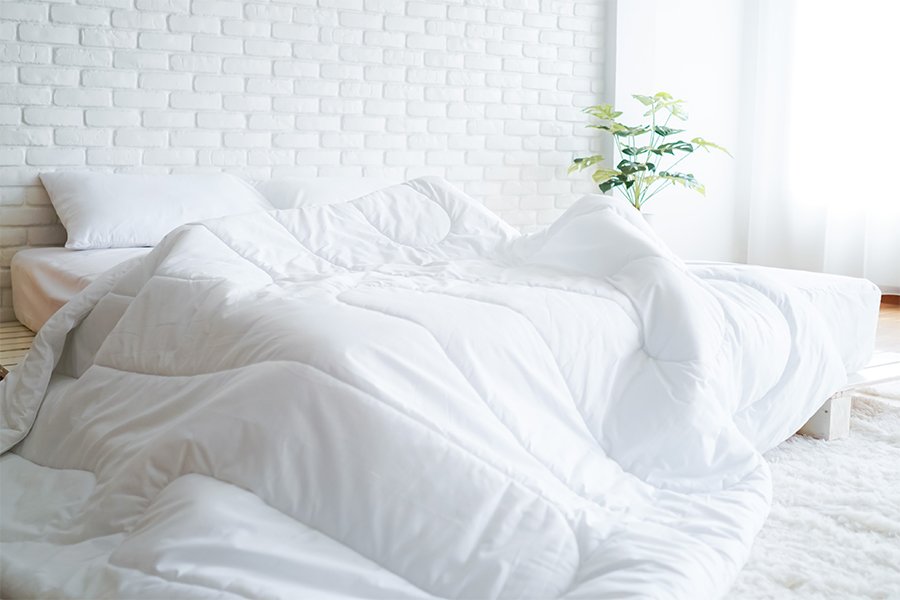Have you tossed and turned all night, waking up feeling groggy and unrefreshed? The issue might not just be stress or a late-night cup of coffee. Your bedding is the often-overlooked sleep companion that plays a significant role in your rest quality. In this article, let’s discuss how the wrong bedding can affect your rest and sleep.
Why Does Adequate Bedding Matter?
Your bed is not just a space to relax and sleep; it’s your personal sanctuary and a place where you retreat to recharge. Your bedding, from the sheets to the pillows, creates an environment that either promotes or hinders restful sleep. The right bedding can help you sleep better by regulating your body temperature and providing adequate comfort. Additionally, a good night’s sleep is essential for physical and mental health.
The Science of Sleep and Its Stages
To properly understand the bedding impact, you must first understand the science of sleep. A typical night’s sleep consists of various stages, such as:
- REM (Rapid Eye Movement) Sleep: A stage crucial for cognitive functions like memory and learning.
- Light Sleep: A transitional phase between wakefulness and deeper sleep.
- Deep Sleep: A vital stage where the body repairs tissues and strengthens the immune system.
How Does Bedding Influence Sleep Quality?
Let’s understand the points below:
Temperature Regulation
- Thermal Insulation: For colder climates, wool and down offer excellent insulation, keeping you warm and cozy.
- Moisture-Wicking Technology: Modern fabrics with moisture-wicking properties can help regulate temperature and prevent discomfort.
- Breathable Fabrics: Natural fibres like cotton, linen, and bamboo excel at temperature regulation. They wick away moisture, keeping you cool and dry.
Comfort and Support
- Pillow Selection: The appropriate pillow supports your head and neck, providing comfort and ensuring optimal sleep posture. So, select a pillow that aligns with your sleeping position (side, back, or stomach).
- Mattress Choice: A supportive mattress helps align your spine, decrease pain, and promote relaxation. Before choosing a mattress, consider factors such as materials, thickness, and firmness.
- Duvet and Duvet Covers: A duvet plays an essential role in enhancing your sleeping experience. A well-chosen, naturally made duvet provides comfort and prevents allergies. On the other hand, a quality cover is necessary to provide adequate protection to your duvet and enhance the overall look of your bedroom. While choosing a duvet and cover, be sure to consider factors like quality, colours, pattern, and material used.
Allergy Control
- Cleaning Regularly: Consistent cleaning and laundering of bedding products is essential to minimize dust mites and other allergens. However, to maintain the longevity of your bedding products, use a mild detergent instead of harsh chemicals every time.
- Hypoallergenic Materials: The main reason for getting allergies the moment you wake up can be your wrong bedding. Low-quality bedding quickly accumulates dust, increasing the risk of allergies. Therefore, you must opt for hypoallergenic bedding made from materials like bamboo, or microfiber can reduce allergy sufferers’ exposure to allergens.
- Pillowcases and Mattress Covers: Just as a duvet is effectively safeguarded by a high-quality cover, a pillowcase and a mattress cover is essential for protecting your mattresses and pillows from food or liquid stains, dust mites, and bacteria. Prioritize these protective measures to ensure a cleaner and healthier sleeping environment.
Some Eco-Friendly Bedding Options
Bamboo: Bamboo bedding, such as sheets and blankets, has gained popularity due to its rapid regrowth and low water needs. Mattresses, pillows, and duvets made from this material are naturally antibacterial, temperature-regulating, and moisture-wicking, keeping you warm in winter and cool in summer.
Organic Cotton: Organic cotton is grown without synthetic fertilizers or harmful pesticides, making it a healthier option for both your skin and the environment. This natural fibre is soft, breathable, and hypoallergenic, promoting a safe and comfortable sleep environment.
Recycled Fibres: Recycled polyester and other fibres from post-consumer plastic bottles are increasingly used in eco-conscious bedding. This bedding option combines sustainability with comfort and is a step toward a circular economy.
Where Can I Get Eco-friendly Bedding Products?
You should look for reliable online stores that provide high-quality, natural, organic bedding products. Navigate to the stores’ official websites and explore a variety of products. Review the information and look for certification to ensure you don’t buy a bedding product made of low-quality materials.
To Summarize
Your bedding choice goes far beyond aesthetics—it directly impacts the quality of your sleep and, in turn, your overall health and well-being. Investing in supportive, comfortable, eco-friendly bedding can help create a peaceful sanctuary promoting restful sleep. From choosing materials that regulate temperature to selecting hypoallergenic ones that reduce allergens, making thoughtful bedding choices can transform your bedroom into a true haven of relaxation. So, take the time to assess your needs and select bedding that aligns with your lifestyle. A better night’s sleep could be just a few changes away!



